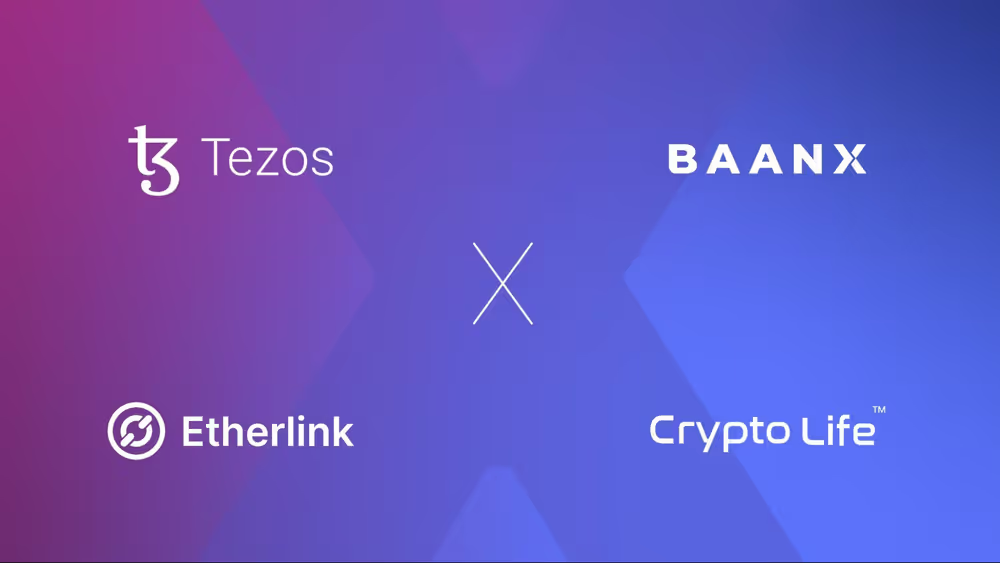Baanx x Tezos Introduce First Non-Custodial On-Chain Crypto Card
Discover how Baanx and Tezos are revolutionizing decentralized finance with the first non-custodial on-chain payment card.
5 minute read

Baanx and Tezos are launching an on-chain debit card that utilizes Etherlink, a Smart Rollup blockchain powered by Tezos. As the first non-custodial on-chain cryptocurrency payment solution, this innovative card leverages account abstraction to allow users full control over their cryptocurrency assets. Already in Q2 2024, Baanx has launched a custodial payment card in collaboration with 1inch and Mastercard, marking a significant development in the crypto industry.
Baanx has enhanced existing cryptocurrency payment cards by integrating established finance from Web2 and leveraging Web3 courtesy of the Tezos blockchain. This solution offers lower fees, faster transactions, and increased financial autonomy.
Bridging traditional finance and Web3 #
Baanx is focused on bridging the gap between traditional finance and Web3, empowering users, including the unbanked, with advanced and user-friendly financial services, such as a cryptocurrency-compatible card. ‘Crypto’ cards offer the same versatility as traditional bank cards, making them suitable for online purchases, in-store transactions, pop-up booths, transportation, and more.
Baanx’s CCO Simon Jones alluded to their growing usage.
The use of cryptocurrency cards is growing, especially among the 25-44 age demographic. The potential market is vast, with the global payments industry valued at $2.4 trillion and approximately 1.4 billion people unbanked. Baanx aims to replace traditional banking with technology, offering financial services to anyone with a mobile phone.>
Non-custodial on-chain crypto payments #
Web2 and Web3 payment solutions currently face the same challenge. Traditional banks and crypto payment solutions fail to offer users full control over assets, leading to security risks and inefficiencies.
Most current cryptocurrency payment solutions are flawed: they often require users to hand over control to third-party custodians and increase counterparty risk. They typically impose high fees and have slow processing times, especially for cross-border transactions. Additionally, their complex interfaces deter mass adoption among non-technical users.
A non-custodial solution is the answer. This approach means:
- Full control – Users maintain complete control over their assets, eliminating the need for third-party custodians and reducing counterparty risk.
- Security – With non-custodial wallets, private keys are kept by the users, enhancing security and reducing the risk of hacks and unauthorized access.
Baanx crypto-fiat debit card #
Baanx is introducing the first non-custodial on-chain cryptocurrency payment solution on the Tezos blockchain, allowing users to retain full custody and control of their crypto assets whilst having the ability to spend them securely on a debit card at merchants across the globe.
This innovative on-chain debit card leverages Etherlink, an EVM-compatible layer 2 blockchain powered by Tezos, to provide a secure, efficient, and user-friendly payment method. Etherlink is the default chain across their ecosystem and a key blockchain for payments. It addresses the aforementioned challenges via:
- Self-custody: Utilizing account abstraction, users retain full control over their cryptocurrency assets while using the card, adhering to the principle of “your keys, your crypto.”
- Fast and low-cost transactions: Etherlink ensures sub-second block times and significantly lower gas fees, making real-time payments practical and affordable.
- Financial inclusion: By offering lower fees, faster transactions, and increased financial autonomy, this solution empowers millions of unbanked individuals with advanced financial services.
- Intuitive User Interface: the card’s UI is designed to make the user experience as smooth and straightforward as possible. It allows users to link wallets easily, set spending limits, and manage funds, ensuring that even non-technical users can easily navigate the system.
- Decentralized approach: Tezos Smart Rollups are recognized as special entities and supported directly by the Tezos protocol, enabling high decentralization. This eliminates the need for complex smart contract workarounds and centralized sequencers.
How the card works #
The debit card will be available in physical and virtual formats and via Google and Apple Pay, offering users all the benefits of a standard debit card. It enables online and in-person crypto purchases and cash withdrawals at supported ATMs through seamless crypto-to-fiat conversion.
Linking the card to a wallet requires only a quick sign-up and an on-chain transaction to delegate funds. Users can set spending limits and manage their card through an intuitive UI. The card employs account abstraction and delegation, ensuring users retain custody of their funds until they are ready to spend them. It also supports multiple funding sources, transforming the wallet into a super account.
Driving mass adoption #
Baanx is driving mass adoption of crypto payments by seamlessly integrating with popular cryptocurrency wallets. Ledger, Exodus, Trust Wallet, and 1inch provide secure, user-controlled cryptocurrency management and DeFi integration with multi-currency support and user-friendly interfaces across various platforms. Individually, have launched on-chain Crypto Life Cards with Baanx.
Global expansion is also on the cards. Initially targeting Europe and the UK, Baanx has ambitious plans to attract one million users within the next 12 months and expand to the United States, Latin America, and Asia. This expansion promises to bring the benefits of non-custodial on-chain crypto payments to a global audience.
A promising future for cryptocurrency payments #
By addressing critical issues in security, accessibility, cost, and user experience, this novel payment solution paves the way for a decentralized, self-custodial financial future. This solution offers a promising alternative to traditional banking systems and advances the global adoption of cryptocurrency payments.